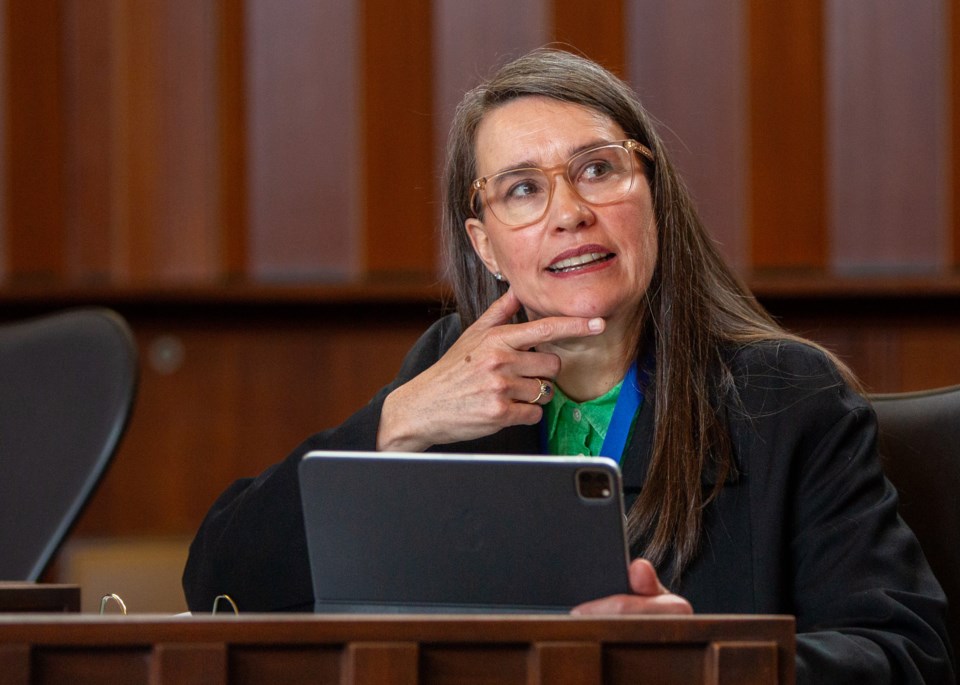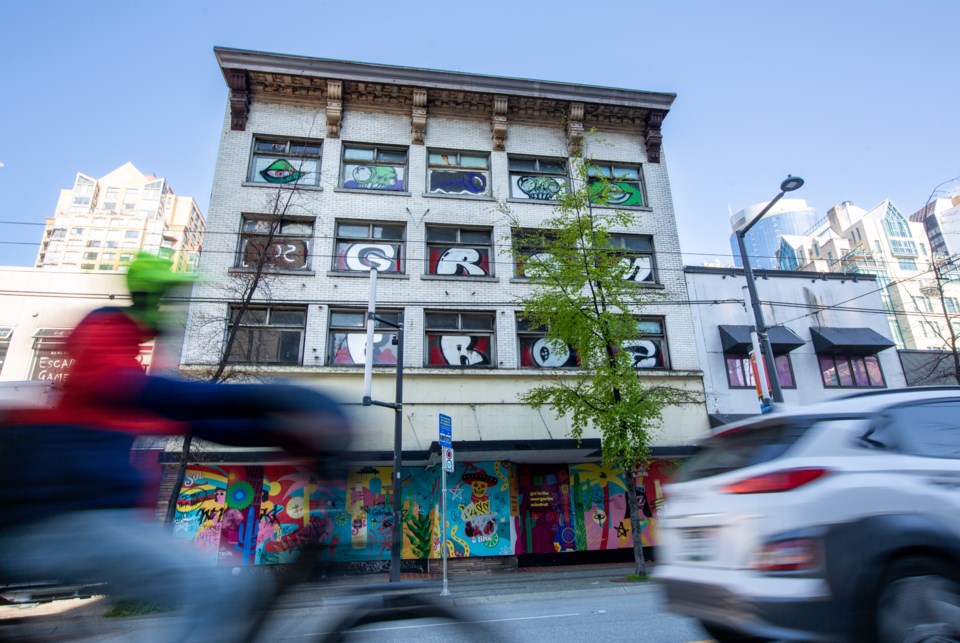A $1.1 million fee that the owner of a vacant single-room-occupancy building on the downtown Granville strip must pay to transform his property into a commercial hotel was the subject of much debate at Vancouver city hall this month.
Four councillors at an April 15 council meeting questioned why the fee was so low when the single-room-accommodation (SRA) bylaw states that a building owner can be subject to a payment of $300,000 per room to proceed with the conversion.
In the case of the former Clifton Hotel at 1125 Granville St., which once operated 74 low-income rooms until the city ordered it closed in 2015, the bylaw suggests the fee could have been set at approximately $22 million.
But what council heard from Bill Aube, a city property development officer, is that staff conducted a “residual land value analysis” of the proposed project to arrive at the $1.1 million fee.
Council also heard the city’s push to revitalize the Granville strip, coupled with the need to build more hotels in Vancouver, were other factors in recommending that the project proceed. What each new hotel room could generate in the local economy from future guests was also considered.
“I am fully cognizant that that what we arrived at comes nowhere close to $300,000 per door,” Aube said. “But in our analysis, this was what we felt the project could actually support.”
Solterra Development Corp
Kevin Yang of Parkfield Ventures Inc., which shares the same address as Solterra Development Corp., is the applicant and wants to transform the building into a 67-room commercial hotel, with retail at street level.
BIV left a phone message at Parkfield Ventures to learn more about the project, but did not receive a response before this story was published. Solterra specializes in building residential highrises and townhomes, and its real estate portfolio includes business parks.
Staff confirmed Solterra bought the Granville Street property in 2016, the year after the city’s chief building official ordered the building closed because of unsafe conditions. It has been vacant ever since.
The building is more than 100 years old and is listed on the Vancouver Heritage Register. It has had a notorious past and was declared in 2013 as the second-worst building on the city’s rental property database.
Violations included melted electrical devices, no running water for six days, the lack of fire walls between floors and walls, inoperable washrooms, cracked and bulging walls and a faulty structural beam.
Tenants were illegally evicted by the previous owner.
SRA bylaw enacted in 2003
The fee for the project is in play because of the SRA bylaw, which was enacted in 2003 to manage the loss of low-income housing and the displacement of tenants in the downtown core.
Under the bylaw, owners wanting to alter, convert or demolish SRA-designated rooms must apply for and obtain an SRA conversion or demolition permit. Council must evaluate each application on its own merits and may refuse the permit, approve the permit outright, or approve the permit with conditions.
In this case, the $1.1 million will be deposited into the city’s SRA “replacement reserve” and used for improving or replacing other SRA-designated buildings, according to a city staff report.
“Each SRA conversion or demolition permit application is unique, and staff work with the applicant to bring forward a recommendation to council that meets SRO improvement and replacement objectives while balancing other priorities including heritage and, in this case, anticipated area plan objectives,” the report said.
When the bylaw was approved in 2003, an owner wanting to transform an SRO was subject to a fee of $5,000 per door. Over time, the amount has increased to reflect the replacement cost for a self-contained social housing unit.
Council heard that replacement cost is now more than $400,000.

$8 million fee
During debate, OneCity Coun. Lucy Maloney made a failed attempt to increase the fee Solterra would pay to $8 million. Green Party Coun. Pete Fry also tried to send the report back to staff to negotiate a fee higher than the $1.1 million.
In both cases, ABC Vancouver councillors sided with staff’s recommendation.
“If we were to pass this amendment with this sort of ethereal $8 million, then I think what we would have would be no hotel built, no $1.1 million for social housing, and a loss of a heritage building because it would sit vacant and it would continue to decay over time,” said ABC Coun. Sarah Kirby-Yung.
Maloney’s push for $8 million was not “ethereal,” but based on a previous staff report in 2015 that contemplated setting the fee at approximately $125,000 per room, which would actually mean a payment of $9.2 million.
It would be $8.3 million if it were 67 rooms — the number of new hotel rooms proposed by the developer.
The $125,000 fee was set the year before Solterra bought the building.
'Let it deteriorate'
Maloney said the $8 million would be “a fair reflection of what’s at stake” and to discourage future owners from sitting on a building and failing to maintain it, which “tips more people into homelessness.”
Both Fry and Coun. Rebecca Bligh, who sits as an independent, raised concerns about the precedent a $1.1 million fee would set for other SRA building owners who might want to transform their properties.
“I want to uphold the $300,000 per door as much as I possibly can because I do think there’ll be more that will come across our city — and it will be an opportunity for a building owner, a landlord, to sit on a building, to let it deteriorate, and then to eventually wait it out to get this deal,” Bligh said.
Fry said he appreciated that $22 million or even $8 million would significantly alter the pro forma on the project, but argued “we can do better than $1.1 million.”
He said it is “not a lot of money when we’re talking about a massive development corporation like Solterra,” which has holdings across North America, including Vancouver.
“Frankly, if we’re [charging] $16,000 a door, we are opening the floodgates for every speculative property developer to come in and start buying SRAs,” he said.
'Project simply wouldn't proceed'
Staff were asked by council that if they were directed to negotiate a higher fee whether Solterra would be receptive.
Deputy city manager Armin Amrolia said the city has had “extensive discussions with the developer and the owner and this is the maximum amount that we could negotiate with them. Actually, the offer was a bit lower than the $1.1 million initially, but this is where we’re at.”
Aube added that “it is my belief that the project simply wouldn’t proceed and that we would be left with the status quo for an indefinite period.”
In the end, council voted 6-3 to set the fee at $1.1 million, with Fry, Bligh and Sean Orr of COPE opposed. Maloney voted in favour with Kirby-Yung, Brian Montague, Mike Klassen, Lenny Zhou and Lisa Dominato.
In her closing remarks, Maloney said: “This is a real dilemma because I absolutely don’t want to see this property sit idle, and I can see the benefits of having this go ahead, but I would like us to do better and not pretend that negotiating is as easy as following a formula.”
X/@Howellings



